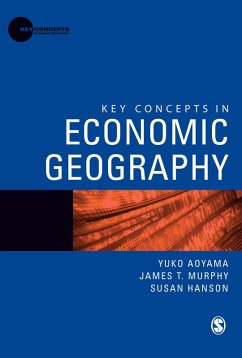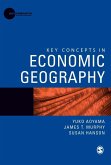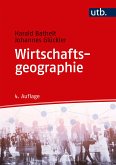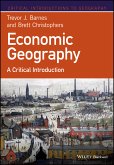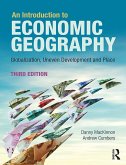"A comprehensive and highly readable review of the conceptual underpinnings of economic geography. Students and professional scholars alike will find it extremely useful both as a reference manual and as an authoritative guide to the numerous theoretical debates that characterize the field."
- Allen J. Scott, University of California
"Guides readers skilfully through the rapidly changing field of economic geography... The key concepts used to structure this narrative range from key actors and processes within global economic change to a discussion of newer areas of research including work on financialisation and consumption. The result is a highly readable synthesis of contemporary debates within economic geography that is also sensitive to the history of the sub-discipline."
- Sarah Hall, University of Nottingham
"The nice thing about this text is that it is concise but with depth in its coverage. A must have for any library, and a useful desk reference for any serious student of economic geography or political economy."
- Adam Dixon, Bristol University
Organized around 20 short essays, Key Concepts in Economic Geography provides a cutting edge introduction to the central concepts that define contemporary research in economic geography. Involving detailed and expansive discussions, the book includes:
An ideal companion text for upper-level undergraduate and postgraduate students in economic geography, the book presents the key concepts in the discipline, demonstrating their historical roots and contemporary applications to fully understand the processes of economic change, regional growth and decline, globalization, and the changing locations of firms and industries. Written by an internationally recognized set of authors, the book is an essential addition to any geography student's library.
- Allen J. Scott, University of California
"Guides readers skilfully through the rapidly changing field of economic geography... The key concepts used to structure this narrative range from key actors and processes within global economic change to a discussion of newer areas of research including work on financialisation and consumption. The result is a highly readable synthesis of contemporary debates within economic geography that is also sensitive to the history of the sub-discipline."
- Sarah Hall, University of Nottingham
"The nice thing about this text is that it is concise but with depth in its coverage. A must have for any library, and a useful desk reference for any serious student of economic geography or political economy."
- Adam Dixon, Bristol University
Organized around 20 short essays, Key Concepts in Economic Geography provides a cutting edge introduction to the central concepts that define contemporary research in economic geography. Involving detailed and expansive discussions, the book includes:
- An introductory chapter providing a succinct overview of the recent developments in the field.
- Over 20 key concept entries with comprehensive explanations, definitions and evolutions of the subject.
- Extensive pedagogic features that enhance understanding including figures, diagrams and further reading.
An ideal companion text for upper-level undergraduate and postgraduate students in economic geography, the book presents the key concepts in the discipline, demonstrating their historical roots and contemporary applications to fully understand the processes of economic change, regional growth and decline, globalization, and the changing locations of firms and industries. Written by an internationally recognized set of authors, the book is an essential addition to any geography student's library.
Dieser Download kann aus rechtlichen Gründen nur mit Rechnungsadresse in A, D ausgeliefert werden.
This book provides a comprehensive and highly readable review of the conceptual underpinnings of economic geography. Students and professional scholars alike will find it extremely useful both as a reference manual and as an authoritative guide to the numerous theoretical debates that characterize the field
Professor Allen J. Scott
Department of Geography, University of California - Los Angeles
This book guides readers skilfully through the rapidly changing field of economic geography. The authors have produced a comprehensive and insightful account of both the heterodox theoretical vocabularies and substantive research concerns that characterise contemporary economic geography. The key concepts used to structure this narrative range from key actors and processes within global economic change to a discussion of newer areas of research including work on financialisation and consumption. The result is a highly readable synthesis of contemporary debates within economic geography that is also sensitive to the history of the sub-discipline
Sarah Hall
School of Geography, University of Nottingham
Professor Allen J. Scott
Department of Geography, University of California - Los Angeles
This book guides readers skilfully through the rapidly changing field of economic geography. The authors have produced a comprehensive and insightful account of both the heterodox theoretical vocabularies and substantive research concerns that characterise contemporary economic geography. The key concepts used to structure this narrative range from key actors and processes within global economic change to a discussion of newer areas of research including work on financialisation and consumption. The result is a highly readable synthesis of contemporary debates within economic geography that is also sensitive to the history of the sub-discipline
Sarah Hall
School of Geography, University of Nottingham

